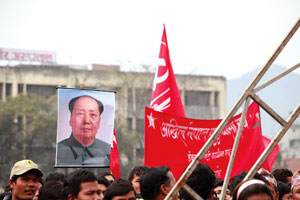 BIKRAM RAI |
The NC and UML have never really felt any ownership for the demand of a constituent assembly nor for federalism based on ethnicity. These were not their key demands of the 2006 democracy movement, and they went along with it only because the Maoists had to be appeased for peace.
The CA was just a means to an end for the Maoists, and when it was no longer useful, they let it go. Identity-based federalism was proving to be intractable, but the parties had found a workable formula in the offer by Janajati activists late on Sunday to accept multiple-ethnic labels. But the Madhesis didn't agree, and Bhattarai and Pushpa Kamal Dahal decided to let the CA lapse and announce elections.
It is clear that the 22 November election will be a de facto referendum on federalism based on identity. The Maoists will be painting the NC and UML as those opposed to change, while the NC and UML will do their utmost to prove the Maoists right. It will be an election campaign in which ethnicity and politics will be mixed into a highly combustible powder. Left-leaning commentators are saying social harmony is a euphemism for perpetuating the status quo, almost supporting a descent into anarchic violence. As if communal co-existence and equality are mutually exclusive.
It is necessary to acknowledge past wrongs for the state to take steps to correct them. But does that have to be through extreme hate speech and stoking a revenge mentality unless a questionable model of federalism is approved? The openly racist slogans at the Janajati and Bahun-Chettri demonstrations across the country give us reason to fear the worst. Some of this is echoed in writings of commentators who almost seem to want this country to be rent asunder.
By using unrestrained racist language to simplistically heap blame on everything in Nepal's history on Bahun-Chhetris, ethno-communists are taking the country down a dangerous path. Such extreme rhetoric closes the door on dialogue and compromise, and can be precursors to the kind of violence that have destroyed other countries in recent history. On social media, the retaliatory barbs from the other side have become just as alarming.
It is a dangerous assumption that once Nepal's ethnic groups have their states, all problems will resolve themselves. We have seen from Yugoslavia, Ethiopia, Sudan and Nigeria that it never happens that way. The hate-mongering last week between Rai and Limbu activists over rival claims in Sunsari could be a sign of things to come in other contested territories.
In the marketplace of ideas, public intellectuals are supposed to find meeting points, a common minimum understanding to steer the country towards a peaceful resolution, not become communalists whipping up antagonism and resentment.
What an irony that the so-called status quoists have more constructive ideas about workable models of federalism than the red elite. They are offering practical solutions on making federalism work, to realistically improve access of the marginalised to resources and equalise state-community relations. Advocates of non-ethnic federalism, many of
them Janajatis themselves, have done pioneering work in decentralisation and community models in the country. But all we hear from the Maoists and their recent converts are slogans. Nepalis are up to here with slogans.
A debate is healthy when both sides come up with compelling arguments. At least this is how it works in democratic and pluralistic societies. Hateful remarks, accusations and provocations are best suited to propaganda-driven communist dictatorships. People don't believe anymore that 'eggs will have to be broken to make an omelette'. Nepalis have moved on, but our communal communists are still dreaming of utopia.
The disillusionment is now complete: except for the party cadre and other opportunists no one really believes the Maoists have the people's well-being at heart when they deliver grand speeches about liberation. The comrades know this, and that is why they will be trying to use the ethnic card in November's elections.
On an issue as critical as state restructuring and system of governance, it may be best to let people decide for themselves. A referendum would allow Nepalis to directly vote for what they think is best for them. Let the people decide, not the pundits, they have always displayed more common sense and compassion.
Read also:
We have a situation here
Death of an institution, KANAK MANI DIXIT
The Constituent Assembly provided an example of how not to write a constitution
Out of the darkness, ANURAG ACHARYA
A national unity government with elections by November is the least parties can now give dejected Nepalis



